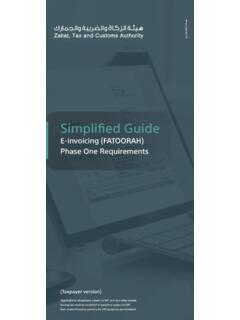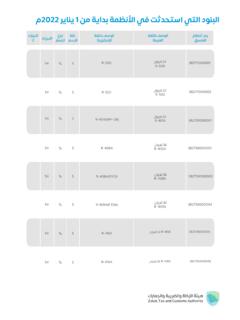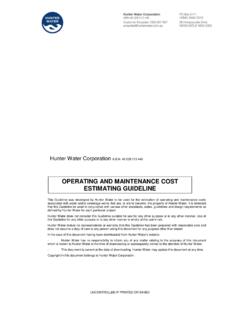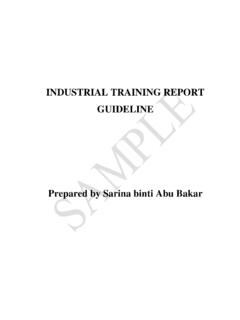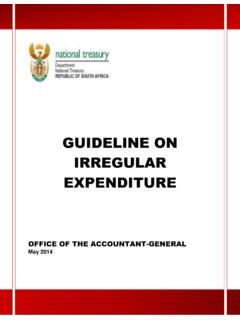Transcription of VAT General Guideline
1 Version 1 VAT GeneralGuidelineNovember 20182 VAT General GuidelineVersion 1 Contents1. Introduction Implementing a Value Added Tax ( VAT ) system in the Kingdom of Saudi Arabia ( KSA ) General Authority of Zakat and Tax What is Value Added Tax? This Guideline 62. Economic Activity and VAT Registration Mandatory Registration: Do you need to register? Who carries out an Economic Activity? Mandatory registration for KSA residents Calculating the Value of Taxable Supplies Notification and effective date of registration Requirements for notification Registration as at 1 January 2018 Registration as at 1 January 2019 Zero rated supplies Failure to Notify Voluntary registration for KSA residents How to register VAT registration certificate Special cases Non-residents Group registration Legal persons with multiple branches, Commercial Registrations or establishments Deregistration Mandatory deregistration Optional deregistration Process 163.
2 Charging VAT When do you need to charge VAT? Who is a Taxable Person? What is a Supply? What is a Taxable Supply? Which supplies are made in the KSA for VAT purposes? VAT charging flowchart Calculating VAT Applying VAT to a VAT-exclusive value Calculating VAT from a VAT-inclusive consideration When does the VAT charge arise? Actual date of supply and earlier dates of supply Continuous supplies Imports and Receipts of Goods and Services Income which is not subject to VAT Nominal supplies accounting for VAT on a nominal supply 253 VAT General GuidelineVersion 14. Issuing Invoices When is a Tax Invoice required?
3 Requirements of a Tax Invoice Simplified tax invoices Circumstances of issuing a simplified tax invoice Content requirements Self-billing Third party billing Electronic Invoicing 305. Claiming Input VAT on purchases Right to deduct Input Tax VAT must be correctly charged Verifying TIN and tax invoice Other Categories of Deductible Tax Customer s eligibility to deduct Persons fully entitled to VAT deduction Deduction of General overheads and non-attributable costs Timing of Deduction Restricted Input Tax Categories of costs restricted for Input Tax deduction Restricted Motor Vehicles Special cases Adjustments to Input Tax Pre-registration VAT 356.
4 Filing and Records VAT returns Guidance on completing each part of the VAT return Alternative reporting cash accounting Payment and refunds Making payment Request for extension in exceptional circumstances Applying for refunds Correcting errors Records 417. Dealing with GAZT Taxpayer charter Audit and Assessment Examination Assessment Taxpayer information and data privacy Applying for the issue of rulings (interpretative decisions) If you disagree with a GAZT decision 528. Dealing with Suppliers and Customers VAT on pricing and contracts Transitional Grandfathering relief Dealing with non-registered suppliers and customers 454 VAT General GuidelineVersion Non-registered suppliers Non-registered customers Applying VAT on transactions with public bodies Public bodies as supplier Public bodies as customer 479.
5 VAT on international trade Applying VAT on imports of goods Import VAT collected by Saudi Customs Calculating import VAT Exempt imports Supplies of imported goods VAT on exports of goods Purchases of services from non-residents Applying VAT on sales of services to non-residents Intra-GCC Trade 5210. VAT in specific situations or transactions VAT and employees Reimbursements Statutory benefits Discounts and rebates Free items Promotional offers Vouchers Agents Agent acts in the name of the principal Agent acts in the Agent his own name Capital Assets Used goods 5811. Penalties 6012.
6 Glossary Major Concepts Transactions Persons VAT Compliance Other Concepts 645 VAT General GuidelineVersion 11. INTRODUCTION IMPLEMENTING A VALUE ADDED TAX ( VAT ) SYSTEM IN THE KINGDOM OF SAUDI ARABIA ( KSA )The Unified VAT Agreement for the Cooperation Council for the Unified Arab States of the Gulf (the VAT Agreement ) was approved by the KSA by Royal Decree No. M/51, dated 3/4/1438 H. Pursuant to the provisions of the Unified VAT Agreement, the KSA issued the VAT Law under Royal Decree No. M/113 dated 2/11/1438 H (the VAT Law ) and its corresponding Implementing Regulations were subsequently issued by the Board of Directors of the General Authority of Zakat and Tax ( GAZT ) by Resolution No.
7 3839 dated 14/12/1438 H (the Implementing Regulations ). General AUTHORITY OF ZAKAT AND TAXGAZT, also referred to as the Authority herein, is the authority in charge of the implementation and administration of VAT (which may be referred to hereinafter as the tax ) in KSA. In addition to the registration and deregistration of taxable persons for VAT, the administration of VAT return filing and VAT refunds, and undertaking audits and field visits, GAZT also has the power to levy penalties for noncompliance with legal provisions relating to VAT. WHAT IS VALUE ADDED TAX?VAT is an indirect tax which is imposed on the importation and supply of goods and services, with certain exceptions.
8 VAT is imposed in more than 160 countries around the world. VAT is a tax on consumption that is paid and collected at every stage of the supply chain, starting from when a manufacturer purchases raw materials until a retailer sells the end-product to a consumer. Unlike other taxes, persons registered for VAT will both: Collect VAT from their customers equal to a specified percentage of each eligible sale; and Pay VAT to their suppliers, if any, from whom they have received the goods or services, equal to a specified percentage of each eligible purchaseWhen taxable persons sell a good or service, a 5% VAT charge assuming a standard case is assessed and added to the final sales price.
9 The taxable persons will account for that 5% that they have collected from all eligible sales separately from its revenue in order to later remit a portion of it to the Authority. The VAT taxable persons collect on their sales is called Output VAT. The same will apply to purchase transactions, in that VAT will be added at the rate of 5% to purchases of goods or services made from suppliers registered for VAT (on the assumption that the basic rate applies to those supplies). The VAT a business pays to its suppliers is called Input VAT. Further information about VAT can be found at 6 VAT General GuidelineVersion THIS GUIDELINEThis Guideline is addressed to all natural persons and legal persons who carry on an economic activity and who will be required to register for VAT.
10 The purpose of this Guideline is to provide information to enable those persons to understand their basic VAT obligations arising from their taxable economic activities, these obligations include for example: Registration Charging VAT on sales Issuing invoices Deducting VAT on purchases Filing VAT returns and keeping records; and Dealing with GAZT, and with suppliers and customersThe Guideline also provides detail on specific transactions types which are relevant to many businesses. In addition, other guidelines provide more information on certain industries or transactions which are subject to more detailed rules.




